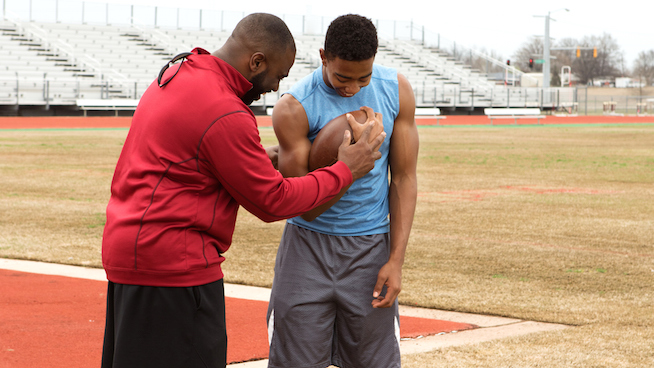Among the richest rewards of being a Positive Sport Parent is the opportunity to have great conversations with your children. You can use the fun and excitement of sports to connect with your children.
To help your children get the most out of youth sports – especially the critical life lessons in teamwork, effort, and resilience that sports offer – here are a few tips and ideas on how to make the most of those conversations:
Wait.
Avoid the dreaded Post-Game Analysis or Car Coaching. Walking to the car is not the time to de-brief. Neither is the car ride home. If your children want to talk about the game, they will start the conversation.
Of course, if there is occasion to celebrate, you should, and if consolation obviously is needed you should provide it. You might ask an open-ended question, such as “What did you think of the game?” If conversation ensues – great. If it seems your child does not much feel like talking, respect that.
Pushing your children to discuss a just-finished game play-by-play, especially if they did not perform too well, is a possible way to turn them off sports and from talking to you.
Ask Open-Ended Questions.
Once a conversation starts, keep it going by minimizing questions that invite a one-word answer. You and your child benefit not just from the length of the conversation, but also its quality.
As a Positive Sport Parent, some of the life lessons you want your child taking from sports include self-expression and ability to think on one’s feet. That is more likely to happen if you ask, for example, “What were you guys saying out in the field when your team took the lead?” Depending on what happened in a game, you also may want to ask even more thought-provoking questions, such as “How did you feel when you saw that player go down with an injury?”
Listen.
Especially if you know the sport your child is playing, it is tempting to share all the knowledge and experience you have. But remember, this is about them and their experience. Your job is to help them process it and learn life lessons.
If you ask a question, really listen to the whole answer. Children perceive that adults rarely listen to them, because, after all, adults are often telling them what to do, say etc. Let your child know you are listening with an occasional nod or “uh-huh.”
Sports are the one area where your children may be able to exert a little control in a conversation. They actually know better than you what was going on during the game, what the strategy was, what coach said. Let them tell you about their experience, and they will want to do so again and again.
Focus on Life Lessons.
There may be a time for instruction in a skill, but more often than you might like to admit, your child’s coach has that covered better than you! What nobody can replace is your unique position as parent to translate the youth sports experience into life lessons
Unless there is something screaming for correction, such as an unacceptable breach of sportsmanship by your child, these topics are best saved for later in a conversation. It may take some time for your child to warm up to a conversation at all, let alone one where you start talking too deeply too soon.
But once the time is right, feel free to steer the conversation to any examples that may be educational for your child, whether from a game, practice, or media coverage of pro sports. For awhile, you will still want to listen more than talk, because if your children can reach their own conclusions about the life lesson they should take, that lesson will hit home harder and stick longer. Then, at a certain point, you may want to be quite explicit in telling them exactly the message you want them to take.
Take Care In Talking About the Sport.
When it comes to discussing the team, coach or on-field action, take care to avoid counterproductive comments. For example, if you disagree with a coach’s decision, do not share that with your child, because it undermines a quality coach-athlete relationship. Similarly, do not put your child in position to negatively discuss teammates, coaches, opponents or officials.
If you feel compelled to offer advice on technique, first ask if your child is open to your advice. If not, respect that: “OK, I’ll wait until you are ready, and then you can just ask me if you want to know.” You might also want to know what your child’s coach is teaching so you can complement that instruction or avoid undoing the good the coach may have done in imparting technique.
One final thing to keep in mind, if you go about your conversations with your child correctly you will see that kids like talking about sports so much, they will even discuss them with their parents!
Read more at https://play-positive.libertymutual.com/parenting/parenting-guide/conversations-athletes#YvoteIQe6XGHFIYl.99
